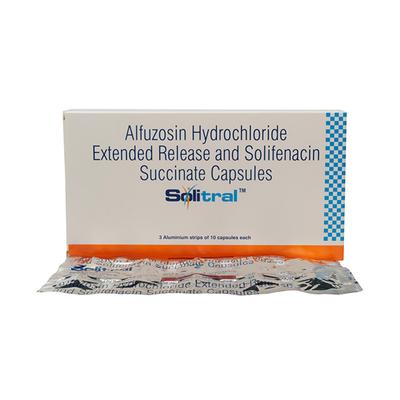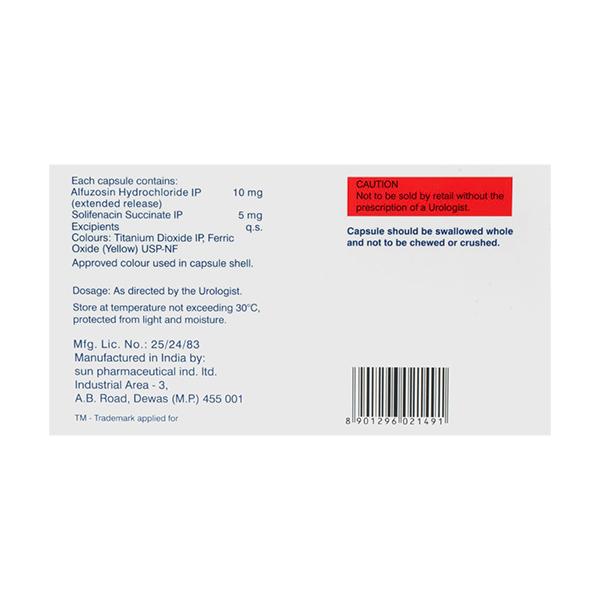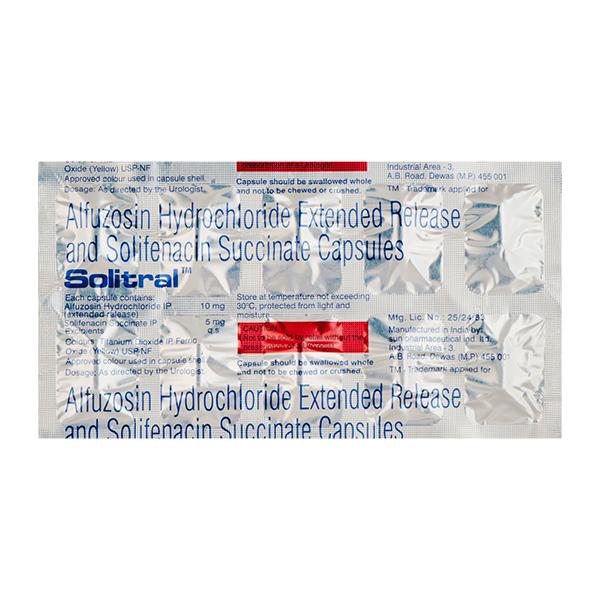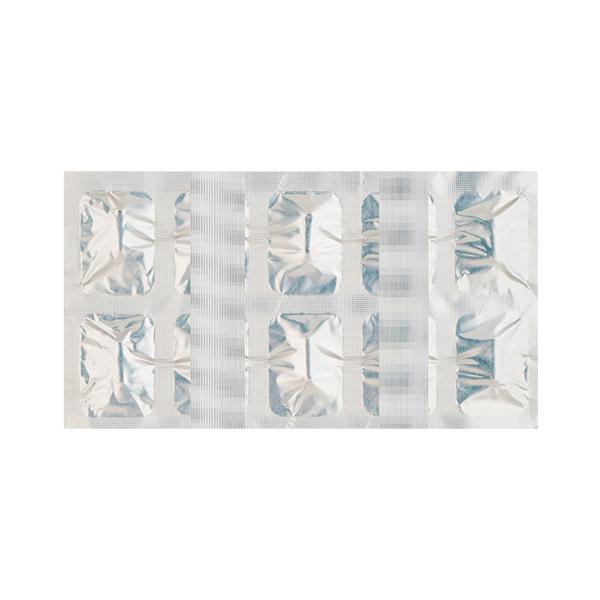

Netmeds First Membership
Quick Links
Introduction About SOLITRAL CAPSULE
SOLITRAL CAPSULE is a combination of Alfuzosin and Solifenacin which belongs to the group of medicines called Alpha blockers and Urinary antispasmodics respectively. It is used to manage overactive bladder (sudden uncontrollable urge to urinate) and other lower urinary tract symptoms (such as incomplete voiding, painful urination, slow or scanty urine or frequent urination at night) associated with Benign Prostatic Hyperplasia (BPH) or other bladder problems.
Benign Prostatic Hyperplasia (also known enlarged prostate) is a non-cancerous growth of prostate gland caused due to increased production of a stress hormone called dihydrotestosterone (DHT) in aging men.
Prior to the management, your doctor will access your urinary tract for any signs of urinary tract infections. Before taking SOLITRAL CAPSULE inform your doctor if you have any kidney or heart disease or due to have any upcoming surgery.
SOLITRAL CAPSULE is not suitable for use in children and adolescents (aged below 18 years). It should be used with caution among elderly patients (65 years or above) due to increased risk of side effects or low blood pressure.
The most common side effects of SOLITRAL CAPSULE are feeling dizzy or faint, headache, tiredness or weakness, dry mouth, constipation and stomach discomfort. Consult your doctor if any of the symptoms worsen.
Uses Of SOLITRAL CAPSULE
- Manage overactive bladder and other lower urinary tract symptoms (such as incomplete voiding, painful urination, feeling of incomplete bladder emptying, slow or scanty urine or frequent urination at night) associated with Benign Prostatic Hyperplasia or other bladder problems
How SOLITRAL CAPSULE Works
SOLITRAL CAPSULE effectively reduce overactive bladder and lower urinary tract symptoms where both alfuzosin and solifenacin acts by blocking the actions of certain chemicals (noradrenaline and acetylcholine) in the body which are responsible for causing urinary problems. Alfuzosin acts by relaxing the muscles surrounding the bladder and prostate and solifenacin acts by stopping the contraction of smooth muscles surrounding the bladder. Collectively they reduce the symptoms of overactive bladder associated with BPH and makes the bladder to hold urine for a longer period.
How to use SOLITRAL CAPSULE
Take SOLITRAL CAPSULE as advised by your physician. Swallow SOLITRAL CAPSULE with a glass of water. Do not crush or chew the medicine. Your doctor will decide the correct dose and duration of therapy for you depending upon your age, body weight and disease condition. Do not stop taking SOLITRAL CAPSULE unless your doctor tells you to achieve better results.
Side Effects Of SOLITRAL CAPSULE
Common
- dizziness or fainting
- headache
- nausea
- stomach pain
- weakness or tiredness
- dryness of mouth
- blurred vision
- constipation, indigestion, bloating, stomach pain, burping and heartburn
Uncommon
- orthostatic hypotension (feeling dizzy or faint while standing up)
- rapid heartbeat
- diarrhoea
- skin rash and itching
- flushes
- swelling of the arms or legs
- nasal allergies (runny nose, itching, sneezing, and stuffy nose)
- urinary tract infections
- feeling sleepy
- loss of taste
- dry eyes, nose, throat or skin
- difficulty in passing urine
Rare
- vomiting
- dry stools which make it difficult to pass
- urine builds up in bladder
Stop taking SOLITRAL CAPSULE and contact your doctor immediately if you experience any of the following side effects:
- chest pain
- signs of allergic reactions (such as skin rash, itching, swelling of the eyes, face, lips, throat, mouth, and tongue which causes difficulty in breathing or swallowing)
- priapism (persistent painful erection of the penis unrelated to sexual activity)
How To Manage Side Effects
Diarrhoea:
Drink lot of fluids such as water or fruit juices to keep yourself hydrated. Avoid taking any medicine on your own for managing diarrhea. Consult your doctor if the symptom worsens.
Headache:
Rest and relax. Drink plenty of fluids such as water or electrolytes. Apply a pain-relieving balm on the head if required. Do not consume too much of alcohol. Consult your doctor if the symptom worsens.
Dizziness:
Try to rest and relax. Get enough sleep. Avoid driving or operating any tools or machines while you are feeling dizzy. Do not consume too much of alcohol, as it can aggravate your dizziness. Consult your doctor if the symptom worsens.
Skin rash:
Avoid hot showers because hot water can irritate your skin further. Do not scratch the affected area. Use protective clothing when going outdoors. Regularly moisturize your skin. Consult your doctor if the symptom worsens.
Warning & Precautions
Pregnancy
SOLITRAL CAPSULE is not intended for use in women.
Breastfeeding
SOLITRAL CAPSULE is not intended for use in women.
Driving and Using Machines
Do not drive or operate any heavy tools or machines if you experience dizziness, weakness, blurred vision, sleepiness and tiredness.
Alcohol
Avoid consumption of alcohol while taking SOLITRAL CAPSULE, as it could make you feel dizzier or drowsier.
Kidney
SOLITRAL CAPSULE is not recommended for use in patients with severe kidney disease, urinary retention (cannot pass urine properly), bladder problems and those who are undergoing dialysis. It should be taken with caution in patients with other kidney diseases. Consult your doctor before taking SOLITRAL CAPSULE.
Liver
SOLITRAL CAPSULE is not recommended for use in patients with liver problems. Consult your doctor before taking SOLITRAL CAPSULE.
Allergy
Do not take SOLITRAL CAPSULE of you are allergic to Alfuzosin or Solifenacin.
Heart Disease
SOLITRAL CAPSULE should be taken with caution in patients with heart disease (such as chest pain, heart failure, abnormal heartbeats). Consult your doctor before taking SOLITRAL CAPSULE.
Others
SOLITRAL CAPSULE is not recommended for use if you:
- have orthostatic hypotension (feeling dizzy while standing up)
- have severe stomach or bowel problems (such as toxic megacolon)
- have myasthenia gravis (extreme weakness of muscles)
- have increased pressure in the eyes (glaucoma) with gradual loss of vision
Before taking SOLITRAL CAPSULE, inform your physician if you:
- have episodes of painful erections (firm penis) without sexual activity
- are going to have an eye surgery (Ex. cataract)
- have block in the digestive tract causing constipation
- have hiatus hernia (a portion of stomach bulges into the chest) or heartburn
- have conditions with severe nerve damage (autonomic neuropathy)
Use in pediatrics:
SOLITRAL CAPSULE is not recommended for use in children and adolescents (aged below 18 years). Consult your child’s doctor for advice.
Use in geriatrics:
SOLITRAL CAPSULE should be used with caution in elderly patients (aged 65 years or above) due to increased risk of low blood pressure or side effects. Consult your doctor before taking SOLITRAL CAPSULE.
Interactions
A. Drug-Drug interactions:
Before taking SOLITRAL CAPSULE, inform your doctor if you are taking any of the following medicines:
- other alpha blockers (used to manage benign prostatic hyperplasia) Ex. doxazocin, prazosin, terazosin, tamsulosin or phenoxybenzamine
- medicines used to manage high blood pressure (Ex. verapamil, diltiazem)
- medicines used to manage chest pain or angina (Ex. nitroglycerin, amlodipine)
- medicines used to manage fungal infections (such as ketoconazole, itraconazole)
- medicines used to manage HIV infections (such as ritonavir, nelfinavir)
- medicines used to manage bacterial infections (such as clarithromycin, telithromycin)
- medicines used to manage depression (such as nefazodone)
- general anesthetics (used to create loss of sensation in the body) Ex. isoflurane, sevoflurane
- other anticholinergic medicines (used to reduce body secretions, reduce muscle movements, increases heart rate) Ex. atropine, hyoscine
- medicines that are used to improve movements in the gut (Ex. metoclopramide and cisapride)
- rifampicin (used to manage tuberculosis)
- medicines used to manage epilepsy (Ex. phenytoin and carbamazepine)
- bisphosphonates (used to reduce bone loss) Ex. alendronate
Overdosage:
If you or anyone else accidentally take too much of SOLITRAL CAPSULE, contact your doctor immediately or go to a hospital straight away. Overdosage symptoms of SOLITRAL CAPSULE might include headache, dizziness, drowsiness, blurred vision, dry mouth, hallucinations, overactivity, convulsions, difficulty in breathing, rapid heart rate, inability to pass urine and dilated pupils (mydriasis).
Synopsis
| Drug | : | Alfuzosin, Solifenacin |
| Pharmacological Category | : | Alpha blockers, Muscarinic antagonists |
| Therapeutic Indication | : | Symptoms of overactive bladder |
| Dosage Forms | : | Capsule |
More Information
- Keep SOLITRAL CAPSULE out of reach of children
- Store SOLITRAL CAPSULE at room temperature
FAQs About SOLITRAL CAPSULE
Can SOLITRAL CAPSULE be taken by older patients?
Yes, SOLITRAL CAPSULE should be used in older patients (aged 65 years or above) only under proper medical supervision, as it may cause severe decrease in blood pressure leading to dizziness and fainting. Consult your doctor before taking this medicine. Your doctor will decide the correct dose and duration of therapy for you depending upon your age, body weight and disease condition.
Can I stop taking SOLITRAL CAPSULE once my symptoms subside?
No, do not stop taking SOLITRAL CAPSULE without consulting your doctor. If you stop taking SOLITRAL CAPSULE the symptoms may return or may become even worsen. Continue to take this medicine as instructed by your doctor to achieve better results.
What precautions should I follow while taking SOLITRAL CAPSULE?
Before taking SOLITRAL CAPSULE, inform your doctor about your pre-existing disease like liver, kidney, heart or stomach problems. Continue to visit your doctor and undergo regular checkups to validate your health condition. Inform your doctor about any previous history of urinary tract infections. Do not drive or operate any heavy tools by yourself, as it may cause extreme dizziness, fainting and blurred vision. If you experience any signs of chest pain or painful erection without sexual activity inform your doctor immediately.
Can the use of SOLITRAL CAPSULE affect my eye?
Yes, SOLITRAL CAPSULE has its impact on the eyes. It can dilate your pupil slightly and can cause blurred vision. Therefore, do not drive or operate any heavy tools on your own. It is important to inform your doctor about SOLITRAL CAPSULE, before going for any eye surgery like cataract, as it can interfere with surgical procedure by making your pupil dilate and iris floppier.
Does SOLITRAL CAPSULE cause liver damage?
Yes, SOLITRAL CAPSULE can rarely cause liver damage (like jaundice) and it is strictly not recommended for use in patients with a pre-existing liver condition. Consult your doctor before taking SOLITRAL CAPSULE.
Can SOLITRAL CAPSULE reduce the size of prostate?
No, SOLITRAL CAPSULE does not reduce the size of prostate. It is an alpha blocker which acts by relaxing the muscles surrounding the bladder and prostate, by which it can regularize urine flow and improves the capacity of the bladder to hold urine. If you wish to use this medicine for enlarged prostate consult your doctor for an alternative therapy.
Can SOLITRAL CAPSULE cause dementia?
SOLITRAL CAPSULE can cause mental problems like dementia (confusions and hallucinations) especially when taken at a higher dose or overdose. Consult your doctor immediately if you experience any such symptoms.
Can SOLITRAL CAPSULE cause impotence?
No, SOLITRAL CAPSULE is not proven to cause sexual impotence. However, it may cause the penis to stay erect without any sexual stimulation (priapism). Consult your doctor immediately if you experience any signs of priapism or impotence.
Can SOLITRAL CAPSULE cause dizziness?
Yes, dizziness is one of the most common side effects of taking SOLITRAL CAPSULE. It is caused due to the hypotensive effects of SOLITRAL CAPSULE. Try to rest and relax. Get enough sleep. Avoid driving or operating any tools or machines while you are feeling dizzy. Do not consume too much alcohol, as it can aggravate your dizziness. Consult your doctor if the symptoms worsen.
Can SOLITRAL CAPSULE be used to manage Benign Prostatic Hyperplasia (BPH)?
No, SOLITRAL CAPSULE is only used to manage symptoms of BPH such as overactive bladder and other lower urinary tract problems. There is no proper evidence regarding the use of SOLITRAL CAPSULE in managing BPH. Consult your doctor before taking it.
References
1. KD. Tripathi. Antiadrenergic Drugs (Adrenergic Receptor Antagonists) and Drugs for Glaucoma. Antiemetic, Prokinetic and Digestant drugs. Essentials of medical pharmacology. Seventh edition. 2013. Page – 142 – 143.
2. Joan Heller Brown and Nora Laiken. Muscarinic Receptor Agonists and Antagonists. Thomas C. Westfall and David P. Westfall. Adrenergic Agonists and Antagonists. Goodman & Gilman’s: The Pharmacological basics of Therapeutics. 12th Edition. New York McGraw Hill Medical 2011. Page – 231 & 307-308.
3. Zhao-Jun Yu, Hai-Lan Yan, Fang-Hua Xu4, Hai-Chao Chao, Lei-Hong Deng, Xiang-Da Xu, Jian-Biao Huang and Tao Zeng1. Efficacy and Side Effects of Drugs Commonly Used for the Treatment of Lower Urinary Tract Symptoms Associated with Benign Prostatic Hyperplasia. Frontiers in Pharmacology. May 2020. [Accessed on 26th April 2022] https://www.frontiersin.org/articles/10.3389/fphar.2020.00658/full
4. Hyun Jung Kim, Hwa Yeon Sun, Hoon Choi, Jae Young Park, Jae Hyun Bae, Seung Whan Doo, Won Jae Yang, Yun Seob Song, Young Myoung Ko, Jae Heon Kim. Efficacy and Safety of Initial Combination Treatment of an Alpha Blocker with an Anticholinergic Medication in Benign Prostatic Hyperplasia Patients with Lower Urinary Tract Symptoms: Updated Meta-Analysis. PLOS ONE. January 2017. [Accessed on 26th April 2022] https://journals.plos.org/plosone/article?id=10.1371/journal.pone.0169248
5. Xinghuan Wang, Xiao Wang, Sheng Li, Zhe Meng, Tao Liu, and Xinhua Zhang. Comparative Effectiveness of Oral Drug Therapies for Lower Urinary Tract Symptoms due to Benign Prostatic Hyperplasia: A Systematic Review and Network Meta-Analysis. PLOS ONE. September 2014. [Accessed on 26th April 2022] https://journals.plos.org/plosone/article?id=10.1371/journal.pone.0107593
6. Sanofi. Electronic Medicines Compendium (EMC). [Revised in September 2020] [Accessed on 26th April 2022] https://www.medicines.org.uk/emc/files/pil.1475.pdf
7. Zentiva Pharma UK Limited. Electronic Medicines Compendium (EMC). [Revised in May 2020] [Accessed on 26th April 2022] https://www.medicines.org.uk/emc/files/pil.10403.pdf














